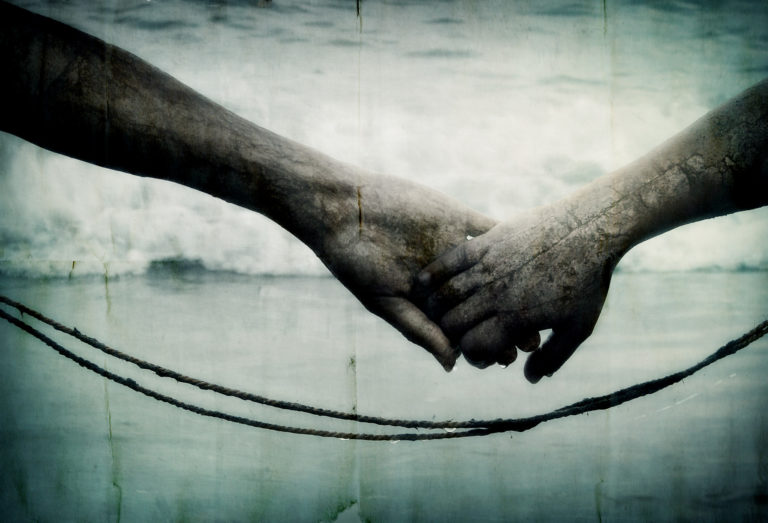
Image by Stelios Nikolaou.
Triumphant, But Scarred: An Advent Reflection on Life, Sorrow, and Loss
On February 6, 2012, I was at work in Delaware when I got a call from Mom in Arizona. Dad was worse, she said. They’d called in hospice.
I hesitated. I was already planning to visit at the end of the month. Did I really need to drop everything — to miss the board meeting of the organization I work for? I phoned the nursing home where Dad lived. Yes, his nurse said. It won’t be long now — maybe hours, maybe days.
I bought a plane ticket, and I missed my board meeting. The next day, looking at the people around me in the airport, I thought to myself, Look at these people, just going about their business. Their fathers aren’t dying. But I also knew that some of them were probably suffering inside just as I was. At least I loved my father, and I knew he loved me. He was 84 and had lived a fruitful life.
My Uncle George picked me up at the airport shuttle stop in Arizona and took me straight to Dad’s nursing home. There he was, lying in a profound sleep, ghastly. It looked like rice paper had been wrapped around his bare skull. He slept constantly, his breathing regular and deep. He didn’t struggle or cry out. When the nurse tickled his foot to check his reactions, he gasped, but his eyes never fluttered.
But he didn’t die — not right away. We waited, Mom and I. We waited by his bed on Tuesday night, all day Wednesday, all day Thursday. We talked to him and cried. I checked e-mail and Facebook. We went to get food and came back. The pastor stopped by, along with several friends, and Aunt Murial and Uncle George, and the social worker from hospice.
I complained to the social worker that Dad was just lingering, and asked her how long it would be. She said, “I can tell that you’re a person who likes to be in control.” Bingo.
“But you’re not in control here,” she said, looking me straight in the eye. “Your father is dying, but he’s dying on his own time. It’s your job to wait.”
That evening, Mom and I went out to eat, but we stopped back at the nursing home before heading home. Mom hugged Dad and cried and told him that she was releasing him to go to heaven. She was finally ready.
And early the next morning, on February 10, 2012, he died. We had his funeral on Valentine’s Day. He and Mom had been married 52 years.
* * * * * * * * * * * * * * * * * * * * * * * * * * *
A month later, my cat stopped eating. I took her to the vet, switched her food. I suspected there was something wrong with her teeth, so I started mixing wet food with warm water to make a noxious fishy soup. Thus encouraged, she ate a little more, but still not enough.
A cat doesn’t compare to a father, but when you live alone, and your cat is the only living thing that greets you at the door when you come home from work, she’s an important part of your life. Like Dad, she wasted away and grew grotesquely thin. Finally, on the day before my birthday, I awoke to find her in horrible shape, staggering around. She collapsed at her water bowl and couldn’t even lift her head. Terrified, I called the vet right away and took her in.
I held my cat as the vet administered the fatal dose. And the vet said that obviously there was some underlying disease — perhaps cancer? — that caused her to stop eating. She weighed less than six pounds by that point. Bereft, I walked home, crying.
* * * * * * * * * * * * * * * * * * * * * * * * * * *
There is sorrow. There is always sorrow.
I suppose there is nothing inherently tragic about an elderly parent dying. My dad lived well and long, and burying parents is a principal duty of children in every culture and every age. And there’s certainly nothing exceptional about putting down a 17-year-old cat. But we feel the loss, especially at this time of year, even though the loss itself is natural and normal. We miss our dads and our pets. We grieve our childhood home, friends who have hurt us, people in authority who have let us down. And sometimes we weep over bigger, truly tragic events — a typhoon’s destruction, children murdered in their school, a society that seems off the rails.
But just as waiting is part of Advent, so is mourning a part of Christmas. The Gospel of Matthew doesn’t hesitate to include it — in a matter-of-fact way, he says that King Herod slaughtered all the boys two years and younger in Bethlehem and its vicinity. Indeed, in his zeal to show that every event of Jesus’ nativity was a fulfillment of scripture, Matthew writes that even the screams of their disconsolate mothers were foretold. “Then was fulfilled what had been spoken through the prophet Jeremiah,” he writes. “A voice was heard in Ramah, wailing and loud lamentation, Rachel weeping for her children; she refused to be consoled, because they are no more.” That could be the parents of Newtown, Connecticut. That could be the parents of Philadelphia’s 329 homicide victims last year alone. Perhaps not as dramatically, that could be you — or me. We too have had occasion to lament.
Jesus escaped Herod’s massacre of the innocents, but Jesus was born into a sorrowful world, and during the reign of a later Herod, he was himself killed with his own mother standing by, like Rachel weeping for her children. After his resurrection, he showed Doubting Thomas his scars. And in the book of Revelation, where he is shown in all his glory, Jesus is still described as “a Lamb standing as if it had been slaughtered.” The reminder is there. He is triumphant, but scarred.
The Scripture confirms our experience — the world is full of pain, the innocent suffer, and there are no ready explanations. But I still hang on to this hope: In the end, our broken Lamb turns things to right. “Behold, the tabernacle of God is with men,” says the triumphant voice from the throne of God in Revelation. “And he will dwell with them. . . . And God shall wipe away all tears from their eyes; and there shall be no more death, neither sorrow, nor crying, neither shall there be any more pain.”
That sounds like heaven to me.
